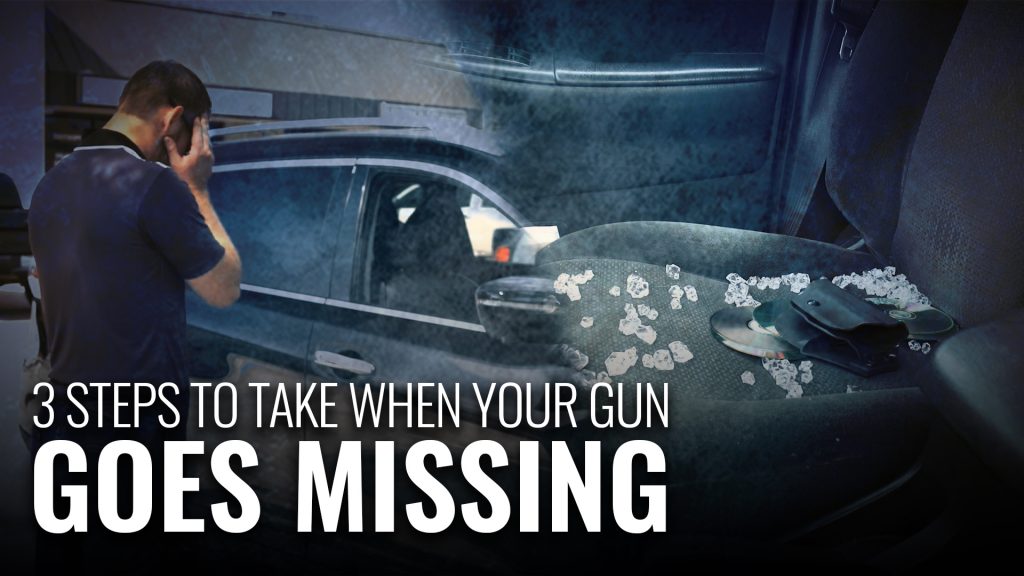
Please consider two scenarios: It is late evening on a nice spring day. When you go outside, you notice something is dreadfully wrong with your vehicle. Quickly, you go up to your car and see the window smashed. You hastily take inventory of your belongings and discover your handgun missing.
Scenario two: You take your gun out of your car and set it down in your garage to unload some groceries, and forget to put it back into its original place. Later, you remember your gun and return to the garage where you left it, and it is gone. Was it lost or stolen?
It does not matter. It is long gone. Either way it’s an unfortunate scenario of loss, and one of the most common ways we, at U.S. LawShield, see firearms stolen or lost.
Minor crimes are soaring during the COVID-19 pandemic and as states refuse to arrest low-level criminals, gun owners are left wondering what to do when their gun goes missing. We want you to be prepared, and today we are going to answer the question, “What do you do if your gun is stolen or lost, here in Oklahoma?”
What to do #1: Keep Records
The first step any gun owner should take before a loss or theft ever occurs is: document your firearm. In Oklahoma, there is no gun registry, so the government won’t keep track of your guns for you. That’s why you need to keep accurate records. You should document each firearm’s make, model, and serial number. We also recommend keeping a copy of the record of purchase, such as a sales receipt or bill of sale.
Additionally, if you want to go the extra mile, a photograph of each firearm can also be very helpful. You should store an electronic backup of these documents and photos. If your gun is recovered by law enforcement, these documents will make retrieving it from the police as easy as possible. If the situation is rapidly unfolding or an emergency, like you were robbed of your gun by an assailant, you should call 911.
What to do #2: Contact your attorney
However, as in our current example, you discover the theft sometime after the fact, and the scene is safe. The next crucial step for protecting yourself after a gun is stolen should be discussing the incident with an attorney. Could it be that the way you stored the firearm was a crime? Did you lose possession of the gun in a prohibited location?
For example, if your gun was stolen while you had the gun on university property, or in the court house, or while parked at a U.S. Army base, it might be a very complicated thing to report theft of a prohibited piece of hardware to the police, who might be interested in arresting you.
Could the police say you were criminally negligent? Was the firearm a prohibited weapon, or illegal for any reason? Did the gun have a serial number? Was it an illegal sawed off shotgun? You must discuss these issues with an attorney before speaking to police.
We have seen people repeatedly and inadvertently incriminate themselves when trying to do the right thing and report a gun stolen, and mistakenly call a legal short-barreled coach gun, with an 18-inch barrel, a sawed-off shotgun. Only a licensed attorney can give you legal advice on your particular circumstances and answer those key questions.
But what happens when your stolen gun turns up at a crime scene or in police custody? We talk to folks all the time who have had the ATF show up at their house with more than a few questions about a gun they once owned, but later turned up at a crime scene involving a fatality.
What to do #3: Disclose to the police
This leads us to the last two steps: reporting the theft to the police by making a lost or stolen gun incident report, and filing a loss report on the lost or stolen gun on the ATF.gov website. The ATF website, Loss Reporter, is a nationwide database that will alert any police or law enforcement of your claim to a lost or stolen weapon. In Oklahoma, you’re not legally required to report a stolen firearm. However, if you don’t report it, and the gun is ever used in a crime, the police will likely have some serious questions. For all they know, the gun never left your possession. Reporting the gun stolen breaks what is commonly referred to as “the chain of custody.” The report clearly delineates when you last had the gun, and when it left your possession.
We hope you never find yourself in this situation, but want you to be prepared. To review, document your firearms. If your gun is stolen, it’s important to discuss the incident with an attorney. And finally, disclose the theft to the police and ATF.gov. These foundational steps only take a few minutes, but can save you hours, days, and even weeks of headache down the line. Who knows? If the gun is recovered by the police, you have a chance at recovery of your favorite hog’s leg.
U.S. LawShield has created a unique add-on that provides extra coverage for this very reason. With Gunowner Identity Theft Coverage an Independent Program Attorney will provide crucial assistance, so you won’t have to deal with the fallout of a stolen gun or identity (affecting your right to carry) on your own. Crooks want to use your gun—not theirs. Don’t wait until it’s too late: add Gunowner Identity Theft Coverage now.
If you have any questions about firearm documentation, call U.S. LawShield and ask to speak with your Independent Program Attorney.
The post What Happens if Your Gun is Lost or Stolen | Oklahoma appeared first on U.S. & Texas LawShield.
